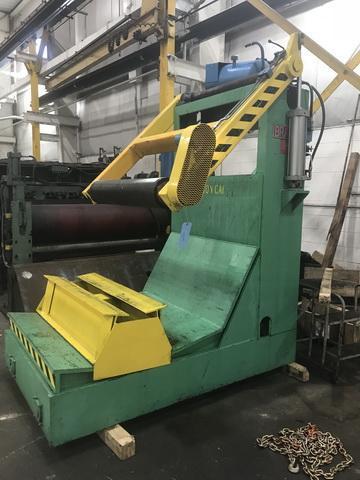
Coil cars are specialized vehicles used in steel processing and other industries that handle metal coils, such as aluminum or copper. These cars are designed to transport coils safely and efficiently across the production line or throughout the plant. Coil cars are essential for moving large, heavy coils from one stage of processing to another, whether it’s from the uncoiling section to the cutting line or from storage to the next processing station.
There are several types of coil cars, each designed to serve specific functions within a steel mill or manufacturing environment. Below are the most common types of coil cars:
- Standard Coil Cars
- Purpose: Used to transport steel coils from one area to another, usually from the decoiling station to the cutting or slitting lines.
- Design: These cars have a flatbed with a coil support system (such as vertical rollers or cradles) to securely hold and stabilize the coil during transport.
- Load Capacity: Standard coil cars are capable of carrying coils of various sizes, with load capacities typically ranging from 5 to 50 tons, depending on the mill’s requirements.
- Turntable Coil Cars
- Purpose: These cars are designed for applications where the direction of the coil needs to be changed during transportation. Turntable coil cars have a rotating platform that can swivel 90° or 180° to move the coil in a different direction without requiring the car to physically turn around.
- Design: The turntable allows easy alignment of the coils with other parts of the processing line or conveyors. This is useful in plants where space is tight or where precise coil placement is necessary.
- Load Capacity: Similar to standard coil cars, turntable coil cars also carry heavy loads, generally up to 50 tons or more.
- Coil Trolley Cars
- Purpose: Often used for horizontal movement of coils over long distances, especially in areas like warehouses or storage yards.
- Design: These coil cars are typically equipped with rollers or cradles that can move along tracks. They often feature an open flatbed structure, and the coils are placed directly onto the bed or cradles for transport.
- Load Capacity: Coil trolleys are designed to handle large coils, often with a capacity of around 10-50 tons.
- Elevating Coil Cars
- Purpose: These cars are equipped with an elevator mechanism that can raise or lower the coil during transport, which is useful when transferring coils between different levels of the mill (for example, moving from a lower conveyor level to a higher storage rack).
- Design: The elevating mechanism is typically hydraulically or electrically powered. The coil car can either raise or lower the entire bed or simply elevate the coil cradles.
- Load Capacity: The load capacity is similar to other coil cars, typically 10-50 tons, depending on the mill’s requirements.
- Automatic Coil Transport Cars
- Purpose: Used in automated steel mills, these coil cars are part of an automated guided vehicle (AGV) system or rail-based system for transporting coils across various stations without human intervention.
- Design: These cars are equipped with sensors, navigation systems, and automated controls to follow pre-programmed paths, load and unload coils, and transfer them seamlessly between sections of the plant.
- Load Capacity: They can carry heavy loads, often from 10 tons to 100 tons, depending on the system design.
- Hydraulic Coil Cars
- Purpose: These cars are equipped with hydraulic systems that allow them to move coils vertically, tilt the coil to the desired angle, or even lift the coil onto a different transport system or conveyor.
- Design: Hydraulic coil cars often come with coil cradles, lifts, or tilt mechanisms. The hydraulics are used to ensure smooth handling and precise control during transport.
- Load Capacity: Hydraulic coil cars typically have capacities from 10 to 50 tons, depending on the needs of the facility.
- Coil Loading Cars (Lifting Coil Cars)
- Purpose: Designed specifically for loading coils onto other machinery or systems, such as cranes, presses, or conveyor belts.
- Design: These coil cars have specialized lifting equipment, like hoists or lifts, to raise the coil from the car and place it precisely into the next station.
- Load Capacity: These cars are designed to handle a variety of loads, generally from 10 tons to 50 tons.
- Coil Reversing Cars
- Purpose: In cases where coils need to be moved in opposite directions (e.g., reversing the direction of a coil after it has been unloaded from one area), coil reversing cars are used.
- Design: These cars include mechanisms to switch the direction of the coils or reverse the coil’s orientation, which is essential for applications such as slitting or processing coils in both directions.
- Load Capacity: Similar to other types of coil cars, they can transport loads ranging from 10 to 50 tons.
Coil cars are an essential part of steel and metal processing plants. The different types of coil cars—standard, turntable, elevating, automatic, hydraulic, and others—offer various features to suit specific operational needs. They are crucial in ensuring efficient and safe movement of heavy steel coils, enhancing overall productivity and safety in the mill.
At Galaxie Corporation, we offer a wide range of high-quality, pre-owned Coil Cars. Our team of experts is dedicated to helping you find the right equipment for your needs, backed by our commitment to excellent customer service.
Click here to check out all of our coil cars for sale.
Whether you’re upgrading your current steel processing line or adding new equipment to your line, Galaxie has the coil car to fit your needs. Contact Galaxie Corporation today to learn more about how our coil cars can enhance your production line, or if you have machinery to sell!
Go back
